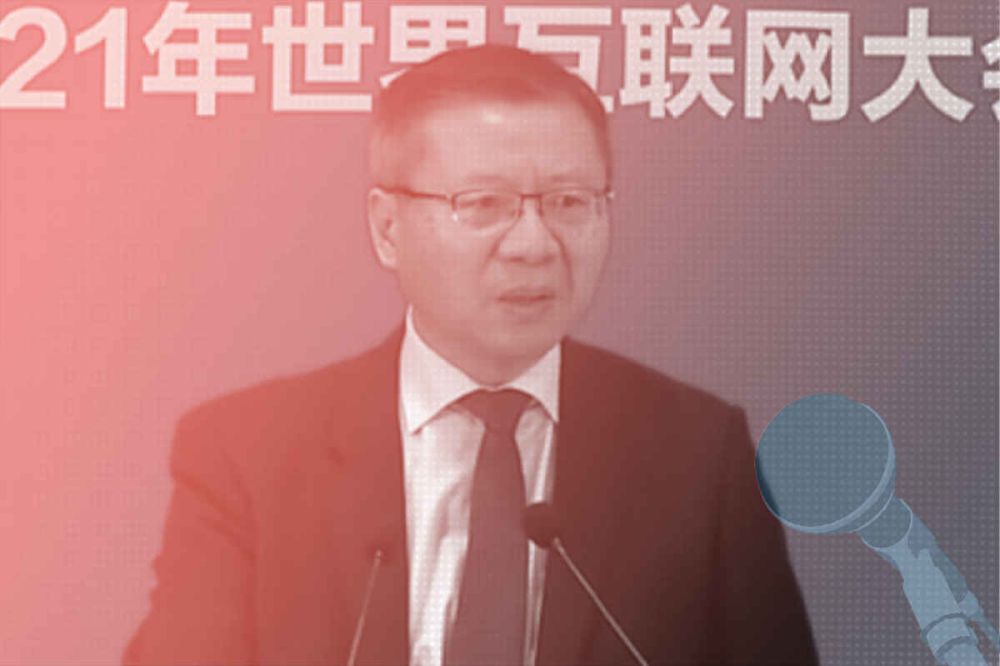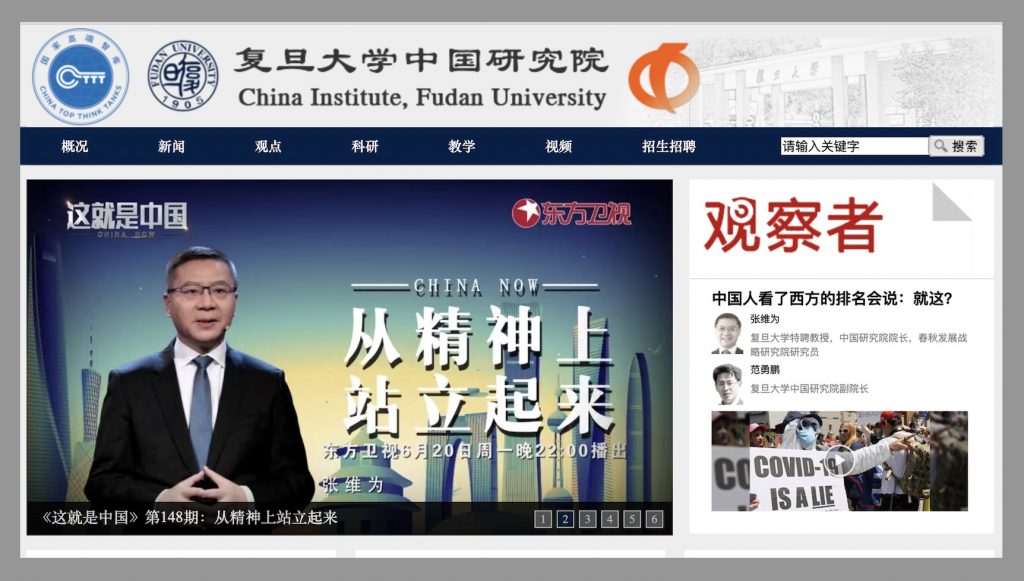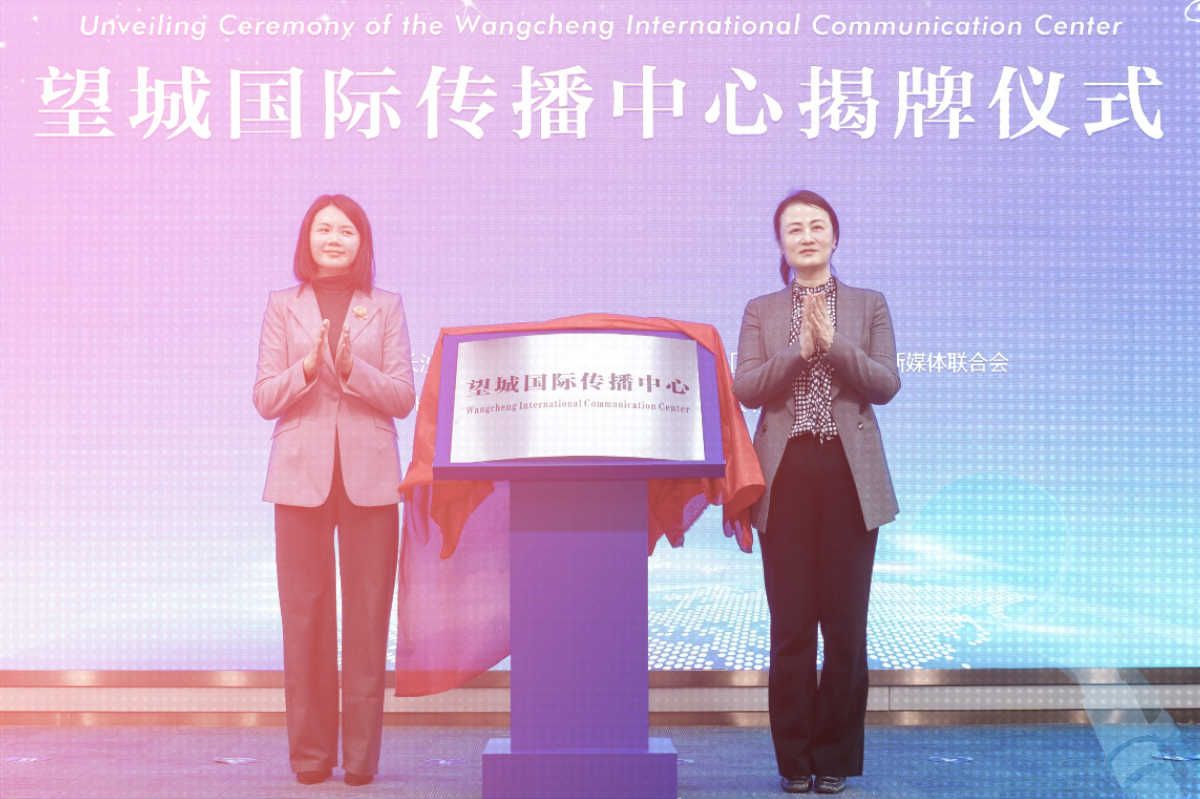Going Global
Eradicating China’s “Spiritual Americans”

Zhang Weiwei at China’s World Internet Conference (WIC) in 2021. Image available at Wikimedia Commons under CC license.
It was just over a year ago that international relations professor Zhang Weiwei (张维为) addressed a collective study session of China’s Politburo dealing with the country’s external communication efforts, where state media tell us he “offered his thoughts on [related] work.” Zhang’s address inside the Politburo session has never been reported in full, but we can suppose on the basis of his past remarks that he stressed the need for China to have “self-confidence” in the power of its own ideas and culture, and to “no longer be subservient to the Western discourse.”
Long part and parcel of Zhang’s thinking, these ideas were fully echoed in Xi Jinping’s speech to the same session, in which he said that China was engaged in a “public opinion struggle” (舆论斗争) with the West, that it must “accelerate the building of a Chinese discourse and narrative system,” “build a strategic communication system that reflects [these] Chinese characteristics,” and then march boldly out into the world with China’s story.
Such talk of a unique Chinese cultural subjectivity, and of the national need for “self-confidence,” may sound like a simple act of affirmation. But it also harbors, even as official China speaks about its desire to be respected and loved globally, a hostility to a broad-brushed notion of the West that invites misunderstanding. And as Zhang Weiwei’s most recent remarks in Shanghai demonstrate, this hostility can turn on domestic society in China in ways that are darkly reminiscent of the purges in the country’s past.
Speaking on Shanghai’s Oriental TV on June 20, on a program called China Now (这就是中国), Professor Zhang, the director of the China Institute (中国研究院院) at Fudan University, railed against what he called “spiritual Americans” (精神美国人), by which he meant Chinese, in particular intellectuals, who were dazzled by the West in the 1980s – and their standards, discourse and sense of culture therefore “infiltrated.”
These “spiritual Americans,” said Zhang, continued to have a powerful influence in China, particularly among intellectual elites, working as tools of Western “ideological hegemony” (意识形态霸权):
One of the most common forms of Western discourse and cultural infiltration of China is to instill certain ‘aesthetic standards’ (审美标准) into Chinese intellectual elites through various forms of exchange or awards, and then to use these Westernized intellectual elites to monopolize Chinese aesthetic standards, and even Chinese standards in the humanities, arts, and social sciences – in this way achieving a kind of ‘cultural training’ and ‘ideological hegemony’ (意识形态霸权) over China.
The program was promoted at Guancha Syndicate, which has a close relationship with the China Institute, giving Zhang a powerful national platform for his ideas.

Zhang went on to attack standards in Chinese academia, which he suggested “blindly pursues quantification” of research results, and which he said had been infected with a commercial mindset, “owing to the influence of Western ideas and the market economy.” The problem, he re-iterated, is that these “spiritual Americans” among China’s intellectual elites continue to spread their infiltrated “spirit,” giving many the impression that the country is on the cusp of a color revolution.
“They have fostered a large number of ‘spiritual Americans’ in China,” he said, “and the influence of this is immense, even fooling some Westerners.”
Zhang’s solution is to encourage a new awakening in China, which he calls “standing from spirit” (从精神上站起来). In this respect, he said, youth in China today are already an inspiration to older generations. While many people in the mainstream cultural sector are asking why Chinese films can’t find success internationally, he said, Chinese youth are forging ahead – promoting online literature, short videos, animation, science fiction and so on.
“They show an immense amount of cultural confidence, and in many aspects are at the forefront globally,” said Zhang. “I have a feeling that China’s young generation, with the vision, values and talent that they have today, will begin a renaissance through the internet and other means that will astound the world.”
A renaissance is an awakening, generally drawing widely on ideas and inspiration. When was a renaissance ever insular? But this is where Zhang’s understanding, and that of the CCP leadership, goes horribly awry. So much of Zhang’s imagined renaissance is a call for awakening to the lies of the developed West, and to the promise of Chinese cultural uniqueness. This is what Zhang Weiwei means by confidence, and it’s a good primer too for how Xi Jinping applies his notion of “cultural confidence” (文化自信).
At its core, this self-confidence celebrates jingoism and xenophobia:
Today’s youth have also stood up in terms of spirit. They relentlessly make fun of American and Western values, ridiculing American and Western arrogance, prejudice, and hypocrisy toward China. And they confidently convey to the world the cultural spirit, aesthetic mood, zeitgeist, and even political advocacy of the Chinese people.
If this is the confidence at the heart of what Xi Jinping called the “building of a Chinese discourse and narrative system,” it is almost certainly not conducive to effective external communication, and the government is ill-advised to heed voices like Zhang’s. This cannot be the “lovable” China of which Xi spoke in his Politburo address.
More concerning, though, is the possible impact such language could have on the further erosion of real cultural and intellectual standards in China, as patriotism and positive energy are upheld as the benchmark. Can we not remember other times in China’s past when fervent youth were unleashed on university instructors to root out “intellectual elitism” and “bourgeois tendencies”? Or when campaigns against “spiritual pollution” targeted literary and intellectual circles?
“We must stand up in terms of spirit,” says Zhang. “This is more important than anything.” But his act of standing, which demands eradication, is not at all new and exciting. It is the poison of China’s past:
“On the one hand, there are the ‘spiritual Americans’ who harbor their dark psychology, and on the other there is a young generation full of self-confidence and sunshine,” Zhang said. “We should drain away the filth, eradicating the influence of ‘spiritual Americans’ in China. And we should in various ways support the movement of China’s positive energy across China and across the world!”





















